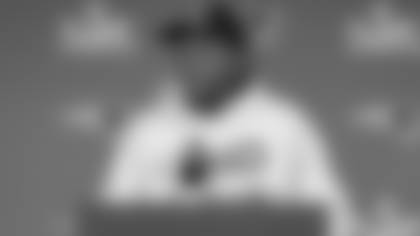HEAD COACH BILL BELICHICK
CONFERENCE CALL
November 25, 2019
Q: How critical was it for the defense to consistently get off the field on third down yesterday?
BB: Yeah, of course those are such big plays. Really, it's not turnovers, but it's probably the next closest thing. Yeah, very important. Our defense has done a good job of that all year. I know the assistant coaches have done a great job with it and players have done a great job of executing in those situations. Dallas, as we know, is very good in those situations. They have a very good scheme so they cause you a lot of problems just schematically as they did yesterday. And then, of course, you have a lot of tough players to cover, very good offensive line and a good quarterback. That was the big challenge for us, I thought our guys really stepped up and met it. We tried to disguise, and I thought that the mixture of coverages was – we tried to make it hard on them. But, in the end you've got to cover them and you've got to be able to rush the passer and all that. I don't think there were any where we really confused them, but I think we just tried to make it as hard on them as we could.
Q: You gave Marcus Cannon quite a bit of praise in your press conference after the game last night. What kind of fine line do you, the training staff and the coaching staff have to walk when evaluating a player like him who is on the boarder of being available to play?
BB: You really identified the problem, and the answer to the question is each situation is a little bit different and you just try to do the best that you can. We're all working together on this – the player, the medical staff and the coaching staff. Unless the player is cleared medically, there's no conversation to be had. If the player is cleared medically, then it enters into some element of a coaching, player conversation. As I said, each one is different and we just try to do the best we can.
Q: Is there a level of trust that factors in, as well? You've coached Marcus for many years.
BB: Yeah, absolutely. That's absolutely right, Mike [Petraglia], you hit it there. It's one thing to have that conversation with a player who's inexperienced and may not really even know where they're at, let alone what's the right thing to do in the totality of the situation. And then there are players that have a great deal of experience and possibly have been through this situation before, or one similar to it, or maybe they observed a teammate in a similar situation. That definitely plays into it. Yeah, experience is a big help in a situation like that, as it is with our training staff and our coaching staff. It's not like that's the first time this has ever happened; it's happened multiple times already this year. And again, sometimes that factors into the game plan and what the nature of the person's injury is and what his expectations would be, what his role would be and so forth. That could be part of it too.
Q: Can you explain, from your perspective, what happened at the end of the game that led to Dallas getting the ball with one second left?
BB: I wasn't paying close attention to the clock – that's the clock operator's job. There's really nothing I can do about that. On the final play, my expectation was that that play was going to take five seconds. Only four ran off. I'm not sure exactly what happened on that. I know it's not more than five. Certainly, it could be less than that – like a spike, for example, would take less than five seconds. So, I'm not sure exactly. I think you'd have to ask the league how they officiated that play and how exactly the timing worked. But, we knew it was going to be close there with Dallas using their remaining timeouts and the amount of time we had left and whether to try to run plays or just not risk ball handling in the conditions or getting the ball potentially stripped or punched out or anything like that. We felt like taking the knee was the safest way to go and just force a one-play situation that we ended up having to defend anyway, but we were kind of prepared for that. But the way the final seconds ticked off with five seconds to go, we thought that play would end it, but it didn't. So, to answer your question, no I don't have a great explanation for that. I think that's something that would have to come from the officials.
Q: You mentioned last night that field position played a major role in the game. I wanted to ask about a few plays. What did you think of the punt exchange when the Cowboys took a 5 yard penalty then had an illegal shift, which ended up saving you 20 yards? Or the completion to Julian Edelman on the third-and-20, and the 23-yard gain that allowed you to erase two and a half minutes off the clock at the end of the game?
BB: Yeah, I agree with you. I think those plays did factor into field position, and as you said, the conversions offensively helped us on the clock management side of it. On the punt – I mean, look, if you get a punt blocked, I think the next time you punt, you're just a little more aware of another potential problem. We tried to keep the pressure on. The punt block that we had came early in the game, so we tried to keep the pressure on that phase of the game and sometimes those – if you have a bad play early, that could possibly lead to another bad play if you can create some indecision or maybe communication or something that could cause your opponents problems. After the delay on the first play, then we gave them a look the second time that, as you said, was an aggressive look. They were trying to shift their gunners and so forth, and I don't think they got set on that, so that backed them up. Then with the continuation of the look – it wasn't a great punt, which again, if you have to punt two or three times in the conditions that we had yesterday, it's pretty unlikely that all three of them or both of them are going to be great punts. I thought Rex [Burkhead] made a real good decision on a shorter, low hang-time punt, and you're right, it saved us some field position there. The other two plays, as you said, being able to convert offensively to stay on the field to run more time and gain field position, which defensively we played on a long field most of the night, or all night really. That's a result of the kicking game and not turning the ball over offensively. Good kickoff coverage – that helped us as well. Again, the conditions weren't great, we had the one punt down inside the 10, had a couple other ones that were close. We, I think, possibly could have had a little better field position than we did, but overall, Dallas was on a long field and that's, on a night like last night, just hard to put together. And Dallas is one of the best teams in the league at long drives; it's just hard to put it together with all the elements.
Q: I wanted to ask you about a second down play, it was the first play of the second quarter right before Stephon Gilmore's interception. It looked like Devin McCourty made an adjustment to something Dak Prescott did right before the snap. Was there something that you saw that led Devin to make the change? How valuable is it to have players who can react to what they're seeing and hearing in real time?
BB: Well, Phil [Perry], just to accent the first point, there were several big plays that helped us on third down early in the game when Jamie [Collins] and Kyle [Van Noy] and I think it was Jon Jones tackled [Ezekiel] Elliot for about a 3-yard loss on second-and-2 or second-and-2, maybe third-and-5. That was another big play for us that created a third-and-longer situation instead of a short-yardage situation, which, again, with Dallas makes all the difference in the world. They're very good in those situations. Those first and second down plays where you can get ahead in the series really help you on third down. Our safety group of Duron [Harmon], Devin and Pat [Chung], those guys have played together for so long and they have so much chemistry, trust and communication with each other that it's really – they have a lot of freedom and flexibility to use the calls and use things that are available in our defensive system to their advantage when different situations present themselves. Some of that could be in disguise, some of that could be to try to position ourselves better against a certain type of look or formation. Devin and Duron and Pat, and Terrence [Brooks] has done a good job of that too, but he just doesn't have the same level of New England Patriot experience that the other three guys do. And Jon and Steph, when you add them in there too and the entire secondary, we just had a lot of snaps together, a lot of meetings together, a lot of walkthroughs together, a lot of practices together. So, they're able to work well with each other and use their positions and alignments to complement what we're trying to do or something maybe that we've done a play or two before to make it look a little differently this time around. But yeah, Devin, Duron and Pat do that on a regular basis really and it's a great luxury as a coach to have players that can make those kind of adjustments. And [Dont'a] Hightower and Collins and [Elandon] Roberts and [Ja'Whaun] Bentley and Van Noy, [John] Simon, they do the same thing on the line of scrimmage. When they see something, there's no way, as a coach – or I'd say it's hard as a coach, before the team has even come out of the huddle and you make a call, to know what you're going to be dealing with. Whereas after the formation breaks and you can see where the players are aligned and who's in the slot, and is the quarterback under center and the shotgun, the back offset to the tight end or away from the tight end, how wide are the splits and so forth and so on – players can make adjustments at that point in time that could be a lot more advantageous than anything you could try to do as a coach prior to that when the guys are still in the huddle and you have to make the call. We're very fortunate that we have such a group of instinctive [players] and players that have great communication and ability to recall situations and get us in the best spot we can be in on some of those.
Q: In the sequence before halftime where you guys got the ball back with about two and a half minutes left, what was your approach with clock management in that situation? Were you trying to run the clock out so the Cowboys didn't get the ball before the end of the half? How much does field position and time weigh versus trying to get points before halftime?
BB: All those factors are important and they would vary from situation-to-situation and game-to-game. When you have the ball and you have three timeouts, time's usually not that big of a factor. When you can stop the clock three times, you pretty much have control of the situation. Having a little less time and having the complement of timeouts gives you quite a bit of flexibility, a lot more so than if you didn't have timeouts. At the same time, Dallas had their full complement of timeouts. They had three, and let's say the wind was favorable to Dallas in the second quarter going away from the lighthouse, going into the closed end. They have a great field goal kicker. [Brett] Maher has already made four kicks over 60 yards. He had the 62-yarder against the Jets when Dallas got the ball back with like 25 seconds to go in the second quarter, completed two passes and kicked a 62-yard field goal right before the half. Against a team like Dallas, any time they get the ball before the half – even, like I said, 20, 25 seconds – one completion and they're in field-goal range. We weren't looking to give them opportunities. At the same time, we were trying to balance that with giving ourselves the best chance to score. That's really what it came down to. We ended up with a field goal attempt on the last play of the half and that was, I'd say, the best you could do, short of scoring a touchdown and we just weren't able to convert it. In terms of clock management, I thought Josh [McDaniels] and Tom [Brady] did a good job of getting the team into a potential scoring position, they just weren't able to capitalize on it.
Q: What do you see when you look back on Stephon Gilmore's interception? How much of his success on field comes from his study habits in watching film and recognizing plays from earlier in the game?
BB: I think it's a combination of those two, Mark [Daniels]. Steph studies the receivers and the passing game very diligently. He's very professional and has a great, I would say, passion for knowing everything about the players that he's matched up against, player or players that he could be matched up against. He has a great deal of confidence and trust in other members of the secondary, other corners and safeties. When there are adjustments in calls to be made, he's right on those as well. Look, studying film is a great part of the preparation and sometimes that can be very helpful. There are other times when teams will do something differently in the game than they've done in practice – not in practice, but that they've done in previous games and maybe those plays were set up to take advantage of something that a different opponent was doing. There are some in-game adjustments and in-game things that after a player – you've played against the guy you're matched up against for a certain period of time, a quarter, a few series, whatever it is, and you maybe start to get a little better feel of that matchup and also maybe what they're trying to do in this game compared to other games that you've studied. It all goes into a big, individual calculation. But Steph's very good at that and we talk during the game and he'll say things during the game, "This is what I thought it was going to be," or sometimes it's, "They're not really doing what we practiced against or what we saw on film, they're trying to do something a little bit different," and so forth. Again, it varies a little bit from game-to-game but he's on it regardless of what it is, whether it's something new or a continuation of tendencies, he's right on top of it. We communicate that to the other guys on the team, the safeties, to Devin and Duron where they may be involved in combination calls or coverages with the corners and kind of talk about how we're going to handle it the next time it comes up. He does a great job of that, and again it's all of the above. It's not necessarily any one thing because it could vary from week-to-week. There's games when teams do things that are different than what we've seen them do on film and we have to be able to adapt to those. On that individual play, it was obviously a great play. His timing – that was one of the hardest catches. It would have been a good play for him to knock that pass down and he was able to extend and lay out and be able to complete the catch. That was an outstanding play, probably one of the best plays we've had all year.





































